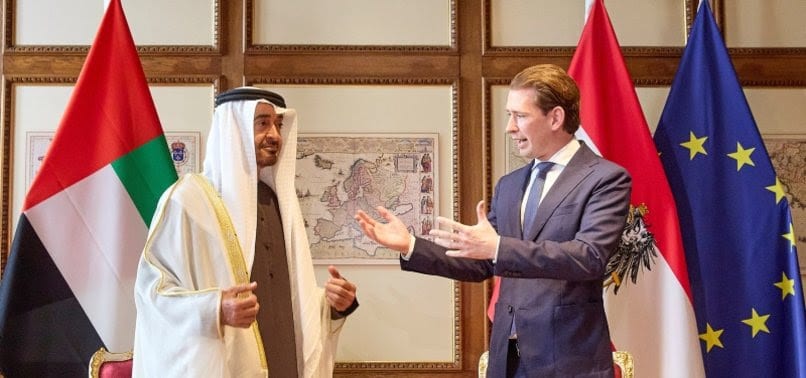In late July, the Austrian capital of Vienna hosted a special guest. It was none other than the Crown Prince of Abu Dhabi. The visit, like any other of the usual protocol-heavy diplomatic visits the world over, would not have garnered too much attention had it not been for the deft way in which the Austrians, and their young Chancellor Sebastian Kurz, charmed the visiting delegation from Abu Dhabi.
The whole affair was heavy on flowery rhetoric that would enchant many an oriental despot.
The entire visit, despite the UAE’s controversial involvement in regional wars garnering complaints of humanitarian injustices from the UN and even from Austria’s own EU partners, was a show of pure theatrical opera that would have made Mozart and the court of the Habsburgs proud.
The meeting between the two leaders ultimately produced a “Comprehensive Strategic Partnership” between the two nations. This partnership will include cooperation in the fields of combatting hateful ideology and terrorism, economic cooperation, tourism, etc. However, it is not the results of the talks that were impressive, but how the Austrians and their Chancellor went about getting the results.
The show began with the setting: The Arabian prince was afforded a military guard of honor at Vienna’s airport. The talks continued in Vienna’s Chancellery building, replete with classical ornamentation from Austria’s rich imperial past, a setting which would impress any leader. And though Austria has welcomed countless statesmen and women to Vienna in the past, what really set the whole occasion apart from the usual was that the entire signing ceremony was broadcast live on Austrian TV; a rare occurrence.
The sight of an Arab sheikh, resplendent in his flowing robes and traditional Arabian headdress walking in one of Europe’s grand capitals made for excellent aesthetics. It may seem petty for 21st-century, post-modern society, but in traditional Arabian societies and structures, these things matter.
The pomp and ceremony was not limited to the visual, but also included flowery diplomatic oratory. Chancellor Kurz used the right words when he described his Arabian guest’s visit as “a source of great pleasure and honor.” These words, especially when translated back into the Arabic language, are music to any Arab monarch’s ears. For Arab rulers, and society in general, words are important – and for this the Austrians deserve full marks.
Referring to the United Arab Emirates as one of Austria’s “most important partners in the Arab region” and its “most important economic partner in the Arab World” didn’t hurt either.
Personalities matter as well. Yes, the representative of the Austrian government met the representative of the government of the United Arab Emirates. But for the latter, “who” is conveying the message, is of utmost importance. Hence, the Crown Prince, when making his statement, specifically called Chancellor Kurz “my friend.”
Whether this visit would have occurred if it was someone else other than Chancellor Kurz is doubtful. Indeed, this particular visit was the culmination of two trips Kurz made to Abu Dhabi in 2018 and 2019. It’s obvious that the Austrians have been slowly and patiently nurturing this relationship for a long time.
The Crown Prince also claimed his visit was aimed at “strengthening the historical relationship between our two countries.” He was referring to the close personal relationship that existed between former Austrian Chancellor Bruno Kreisky and the previous Emir – the Crown Prince’s late father.
Chancellor Kreisky, the Austrians were glad to remind their guests, visited Abu Dhabi eight times between 1973 and 1986; while Sheikh Zayed, the late Emir, visited Austria four times during the same period. Notice again, that it was specific personalities who developed this “historic” relationship. In other words, the relationship was built on the friendship between individuals – personal relationships matter.
While the press from both nations stressed the mostly economic benefits of their partnership, including in the fields of clean energy, tourism and the like, no one can afford to be naïve in this situation. Chancellor Kutz used the occasion to show himself off to the Austrian people, and specifically his Austrian-Muslim demographic, hob-knobbing with a Muslim leader. This is because Austria is facing a domestic terrorism problem, with the latest attack occurring on November 2020 when a lone gunman who was linked to ISIS starting shooting randomly in Vienna’s busy city center, tragically killing five people.

Likewise, there was very little talk in Vienna about the United Arab Emirates’ involvement in the killing fields of Yemen. This is despite the fact that the EU has made numerous calls that arms sales to the UAE, and her allies like Saudi Arabia, should be halted in order to stem what the UN has called a humanitarian catastrophe.
The Italian government recently criticized the Emirates for its role in Yemen and was accordingly shunned by the Emiratis. The Austrians took a different, more realist-based, approach. Regardless of whether you think the Italian or the Austrian gambit is more correct, one thing one can conclude is that the Austrians have done their homework, and the reward for the effort is continued favorable commercial and trading privileges with this lucrative petro-rich potentate, whatever the moral blowback may be.
 UK PoliticsWorld PoliticsVideosPrivacy PolicyTerms And Conditions
UK PoliticsWorld PoliticsVideosPrivacy PolicyTerms And Conditions
